By Mandy Sunderland, Senior Industrial Hygienist, Total Safety
 Crude oils today tend to have more “heavy ends” than lighter crudes of the past. Heavy ends have always been extracted and sold as a relatively low value industrial fuel or used as a feedstock for asphalt-based products, such as roofing tile. But in modern refineries, heavy ends are also processed in Delayed Coker Units (DCUs) to yield a higher value solid carbon residue called petroleum coke.
Crude oils today tend to have more “heavy ends” than lighter crudes of the past. Heavy ends have always been extracted and sold as a relatively low value industrial fuel or used as a feedstock for asphalt-based products, such as roofing tile. But in modern refineries, heavy ends are also processed in Delayed Coker Units (DCUs) to yield a higher value solid carbon residue called petroleum coke.
Coke with relatively low metal and sulfur content is used as a feedstock in the manufacture of anodes for aluminum and steel production. Coke with higher metal and sulfur concentrations is ordinarily used as fuel. This article explores industrial hygiene exposures typically associated with coker operations and recommended measures for controlling or eliminating these risks.
According to OSHA and EPA, there are unique safety hazards associated with DCU operations that have resulted in relatively high rates of frequent and serious accidents. There are also potentially significant industrial hygiene exposures related to DCU operation, including:
- Hazardous gases, such as hydrogen sulfide, carbon monoxide and trace amounts of polynuclear aromatics (PNAs), can be emitted through open drums or during processing operations.
- Accumulated airborne dust around a DCU may exceed acceptable exposure limits.
- Oxygen deficient atmospheres may occur when wet coke in an enclosed area absorbs oxygen from surrounding air.
- Heat stress can occur during warm weather, particularly for those required to wear protective clothing while performing tasks on the coke drum structure.
- Hot water, steam and liquid hydrocarbon (black oil) can escape from a coke drum and cause serious second or third degree burns. In addition, liquid hydrocarbon from a coke drum can be well above its ignition temperature, presenting an additional fire hazard.
Systematic control of hazards and exposures are the key to protecting DCU workers. Recommended controls include:
- Conducting a comprehensive Workplace Exposure Assessment (WEA) and establishing appropriate protective measures that anticipate variations in the range of DCU feed stocks and operating conditions.
- Establishing personnel protective measures to protect against inhalation and contact with coke dust and potentially contaminated mists from water used for cutting, quench, or coke conveyance.
- Reducing dust exposure by providing adequate ventilation and by implementing other controls such as shoveling, sweeping and vacuuming.
- Verifying conformance with a safe entry permit system to ensure appropriate measures are taken prior to and during entry into any enclosed area or vessel where coke may be present.
- Conducting training in recognition and prevention of worker heat stress.
- Configuring coke drums with automated ‘Delta ValvesTM’ to reduce the likelihood of vapor leakage, exposure to high temperatures and contact with unanticipated released material.
Finally, management should ensure that emergency response and medical treatment plans fully account for worst case incidents related to DCU operations. These plans should include regular emergency response exercises that ensure familiarity with emergency signals, evacuation routes and burn trauma response procedures. Comprehensive protective measures and emergency response procedures are needed for Delayed Coker Unit operations, because potential exposure to coke is no joke!








